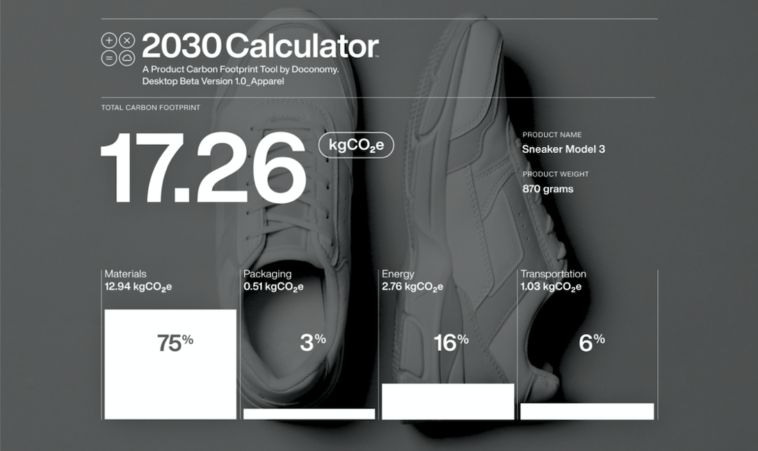The 2030 Calculator aims to enhance impact transparency and democratize fast and reliable product carbon footprint calculations. In turn readily available and consistent calculations enable labeling of all products, so that producers and consumers alike can contribute to reaching the cut in 50 % of emissions by 2030. Transparency will create a new kind of loyalty and brand preference, being able to compare products based on carbon footprint, not only quality and price, enables a much needed shift in consumer behavior, says Johan Pihl, Head of Innovation at Doconomy.
Calculating the carbon footprint of products has been difficult and costly, with regular LCA (Life Cycle Assessment) calculations taking weeks to complete per product. This creates a significant hurdle for brands that aspire to become more transparent. The challenge of product carbon footprint calculations is especially difficult for small- and medium-size brands, which is a problem since many are willing to carbon label their products. The 2030 Calculator can generate a result in minutes, at no cost, empowering brands to be more transparent and motivate consumers to choose lower-impact products.
“I warmly welcome the 2030 Calculator application. I am happy to see that climate considerations remain at the heart of innovation, and it gives me faith that the world can still win this fight,” says Patricia Espinosa, Executive Secretary of UN Climate Change.
The initial beta version of the 2030 Calculator, currently using emissions data from over 300 impact factors, is currently optimized for apparel, but will also allow for the calculation of other products. Future upgrades will include food & drinks, furniture and consumer electronics. The calculator, free to use, enables self-declared cradle-to-gate calculations.
Doconomy, a partner of UNFCCC, is launching the tool as part of their educational global climate impact ambition. It is also part of Doconomy’s overarching impact transparency concept, Planet Loyalty, that aim to establish carbon labeling as the foundation for conscious consumption. The 2030 Calculator has been developed and vetted (ISAE 3000) in collaboration with leading experts within the field of sustainability, data and climate impact such as LCA consultancy 2050 and Ernest & Young (EY).
The tool doesn’t aim to replace full life-cycle assessments. However, independent third-party testing results show high accuracy, making reliable calculations accessible for all.
”We believe business must play a significant role in helping the planet thrive,” says Kristina Kloberdanz, Chief Sustainability Officer, Mastercard. “We’re focused on creating products, services, partnerships, likewith Doconomy, and experiences that enable people to reduce their carbon footprint. We believe it is not only about compensating for your carbon impact, but making better choices for the planet.”
With the release of the 2030 Calculator, https://www.2030calculator.com/ , Doconomy wants to encourage and invite businesses and institutions, to calculate footprint, share their data and collaborate in co-creating the most accurate, free calculator of carbon footprint of products.
